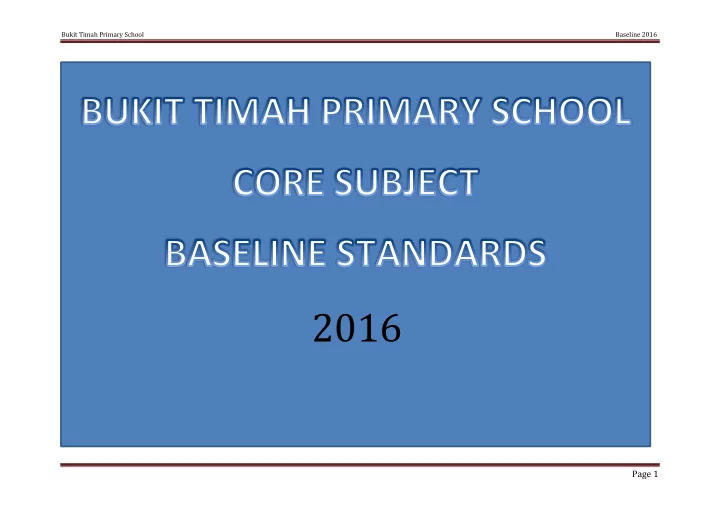

Bukit Timah Primary School Baseline 2016 2016 Page 1
Bukit Timah Primary School Baseline 2016 CONTENT PAGE 1 Overview of IBL-TR 3 2 English 5 3 Mathematics 9 4 Science 16 Mother Tongue – Chinese 5 22 Mother Tongue – Malay 6 25 Mother Tongue – Tamil 7 29 Page 2
Bukit Timah Primary School Baseline 2016 IBL-TR: Foundation, Thinking Behaviour, Engage, Explore, Explain. I STRIVE FOR THE BEST. I TAKE CHARGE OF MY LEARNING! PHASES ENGAGE EXPLORE EXPLAIN ELABORATE EVALUATE of INQUIRY BEHAVIOURS I Pose Questions I Actively Look I Explain my I Link What I I Reflect on My for Answers Thinking Learn to Life Learning THINKING Question Starts Think Pair Share What Makes You Connect Extend I Used to Think ROUTINES Say That Challenge I See, I Think, I Now I Think Wonder Claim Support Mind Maps Think Question Step Inside Puzzle Explore Page 3
Bukit Timah Primary School Baseline 2016 Progressive Implementation 2016 P1 P2 P3 P4 P5 P6 Question Question Question Question Question Question Starts Starts Starts Starts Starts Starts I Used to I Used to I Used to I Used to I Used to I Used to Think Think Think Think Think Think Now I Think Thinking Now I Think Now I Think Now I Think Now I Think Now I Think Routines Mind Maps Mind Maps Think Pair What Makes Claim Claim Share You Say That Support Support Question Question What Makes I See Think Connect You Say That Extend I Think Puzzle Challenge Wonder I Wonder Mind Maps Page 4
Bukit Timah Primary School Baseline 2016 ENGLISH LANGUAGE Page 5
Bukit Timah Primary School Baseline 2016 EL Baseline Standards for Teaching ( 2016 ) The teaching of English in BTPS is anchored on the EL Syllabus 2010 and the STELLAR or Strategies for English Language Learning and Reading. The English scheme of work (SOW) is structured on a progressive teaching process. LOWER PRIMARY STELLAR UPPER PRIMARY STELLAR Page 6
Bukit Timah Primary School Baseline 2016 STELLAR PEDAGOGY IS CENTERED ON: a) Pedagogy To use a variety of teaching strategies including the use of ICT tools to ensure effective delivery of learner-centered lessons. ELLE – English Language Learning Experience: To develop pupils’ creative and thinking skills, and self-directed learning. 1. Using Questioning to assess for learning a. Teachers to generate ideas for writing using brainstorming, asking 5'wh' 1 'H' questions about the topic / picture(s). b. Teachers to use models of good writing to stimulate pupils thinking and raise questions on the format, paragraphing structure, use of vocabulary to enhance development and organisation of ideas c. Teachers to use the graphic organizers like story-maps, mind-maps to stimulate pupils' thinking on the given topic or picture(s). Learning by interacting to Create confident speakers 2. ORACY PROGRAMME Show & Tell activities to stimulate and open up creative discussions. Page 7
Bukit Timah Primary School Baseline 2016 3. Content building by READING To increase the depth and breadth of content in terms of knowledge and skills: Go Beyond the textbooks P3 to P6 : LRD (Little Red Dot) articles used for IBL-TR lessons, journaling, class blogs in AsknLearn P5 & P6: Inspire Magazine - extensive reading Reading Programmes together with NLB as partners : To create a culture of avid readers Joy for Writing: Tackling English Diligently (TED) a. Teachers to teach the different genres of writing: lists, procedures, notes, letters, emails, notices, factual recounts, information reports etc. (as specified in SOW and EL Syllabus 2010). b. No of written pieces: 7 - Term 1: 3; Term 2: 2 ; Term 3: 2. c. Writing to be a joyful experience – by engaging pupils to write attention-grabbing short paragraphs Focus on skills development: introduction (different types), development and conclusions ; Skills to be taught in a progressive, spiral manner. d. To explore expository writing – opinions, arguments, explanations – using LRD articles, Inspire Magazine articles to provide content for discussions. P1: 60words – narrative writing; P2: 80words – narrative writing: 1 st person & 3 rd person; P3: 100 words – narrative writing: 1 st person & 3 rd person; poems ; factual recounts, notes, postcards P4: 120 words – narrative writing; factual writing – personal recount; poems, letters, notes, procedures, personal views P5: 150 words – narrative writing; factual writing; information reports – personal recount; letters, emails, notices, opinions and views P6: 150 – 250 words – narrative writing; factual writing: information reports – personal recounts, letters, emails (formal), notices, opinions and views SPELLING Alternate weeks of spelling words and dictation to be given based on ‘Spelling / Dictation Lists’ given to pupils. GRAMMAR Explicit teaching of Grammar based on SOW & STELLAR Units, in line with EL Syllabus 2010. Page 8
Bukit Timah Primary School Baseline 2016 MATHEMATICS Page 9
Bukit Timah Primary School Baseline 2016 1) Baseline Standards for Teaching of Mathematics 2016 Page 10
Bukit Timah Primary School Baseline 2016 2) Pedagogy - IBL-TR and Polya Strategy The Polya’s Strategy of Problem Solving is aligned to IBL-TR where each level has a focus of Thinking Routine (TR) in each term. (a) Polya’s Strategy of Problem Solving Step 1 Understand underline key information Organize the information Infer information not given TR – Question Starts TR – Think Pair Share (about their understanding and activate each other as resource) Step 2 Plan Identify the topic and Math concept(s) involved Select the best strategy from the various heuristics TR - I See, I Think, I wonder (I wonder if …) TR – What Makes You Say That (is the best strategy) Step 3 Do Solve problem using selected strategy Revise & modify the plan if necessary TR – Think Pair Share Page 11
Recommend
More recommend